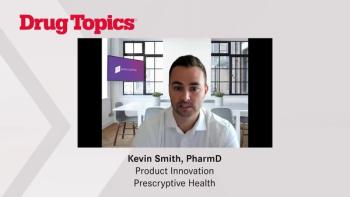
Technology Update: May 8, 2006
SureScripts is preparing to roll out two new services: medicationhistory, and patient formulary and eligibility, using EMPI softwarefrom Initiate Systems. The software matches physician requests to apatient's medication history with the cor-responding records acrossall SureScripts-connected pharmacies.
SureScripts is preparing to roll out two new services: medication history, and patient formulary and eligibility, using EMPI software from Initiate Systems. The software matches physician requests to a patient's medication history with the cor-responding records across all SureScripts-connected pharmacies.
Let's go to the videotape
The Institute for Safe Medication Practices plays host to a library of medication safety videos on its Web site. Drug name mix-ups, glucose monitoring errors, lindane miscues, fatal epinephrine dosing errors, and errors caused by abbreviations are among the topics covered by the tapes of FDA Patient Safety News. Site viewing options include Windows Media, Real Player, or MPEG. Take a look at
SoLapharm has developed technology to allow easy, accurate splitting of generic pills. The Plantation, Fla., drug firm has developed two versions of Accu-Break: one with a deep score for splitting with a knife and one with no score, which segregates the active ingredients into the upper and lower edges with inactive filler material in the middle. The firm is negotiating a joint venture with an Asian firm to develop and manufacture generic drugs using the technology.
High wire(less) act
Medical information and decision support tool developer Pepid is launching initiatives to deliver clinical information and drug data to wireless devices, including laptops, handhelds, and mobile carts. Users can access Pepid Wireless through Internet Explorer or Blazer 4.0 or higher browser. Blackberry fanatics can connect using the Blackberry browser or IE. There's more information at
Virus alert
European computer researchers have shown that software viruses can be inserted into radio frequency identification (RFID) chips. They demonstrated how it's possible to infect a tiny portion of memory in the chips. Many computer security experts had thought RFID tags could not carry viral attacks because of the tiny memory capacity of the chips. The vulnerability could be used to thwart tracking systems, including pharmaceuticals.
Compound interest
New dueling Web sites take opposing views of pharmacy compounding. Critic Sarah Seller, Pharm.D., has created
Take a memo
MemoText has added medication compliance to its lineup of telephone reminder services. The Toronto-based firm offers notifications via automated outbound voice messages to landline phones or text messages to cell phones. The price for 50 messages per month is $8.79. MemoText, a service of Enterprising Vision and Halex Technology consulting, also markets patient adherence solutions to pharmacies and other organizations. For more information, go to
.
Stamp of approval
The FDA has given its approval to DexCom's STS Continuous Glucose Monitoring System for patients with diabetes. The system includes a tiny wire-like sensor that is inserted by the patient just under the skin. It wirelessly transmits continuous readings to a receiver that resembles a cell phone. The device provides real-time readings and alerts patients about high and low glucose levels. The Web site is at
Newsletter
Pharmacy practice is always changing. Stay ahead of the curve with the Drug Topics newsletter and get the latest drug information, industry trends, and patient care tips.























